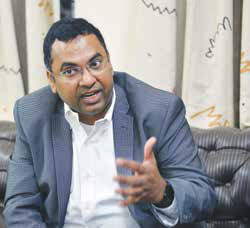
"We can always go and work for anyone, but to run your own business involves lot of risks. It means you don’t get your monthly salary, you have to earn that salary running the business"
He embarked on his career journey with a sales management job in a pharma company, then decided he had enough of sales and travelling and went on to do an MBA in marketing and joined international marketing in IT industry, in the US. Looking for an entrepreneurial stint, Pilla Koteshwar Rao, thereafter started his own management consulting company in the US. In continuation of his passion for entrepreneurship, he then decided returning to the corporate world, and is now working as a senior manager at Accenture US, a global IT company. Rao says it is important to have an end goal in mind—which he always had and was successful. He talks to Corporate Citizen about his career journey and how he accomplished his desired aim
I am from Secunderabad city, but my native place is Vizag, in Andhra Pradesh. My father was in the army, so we moved all over India and finally settled in Secunderabad. When I was a graduate and looking for a job, I didn’t know what career path to chose. I just wanted a job and got an opportunity in a pharmaceutical company. I started my career in 1994, with a company called Monozyne, in Hyderabad. I joined as a trainee and within a year I excelled-was a star performer for five consecutive times—a big achievement for me. Then in 1996, I joined a company called Speciality Ranbaxy, an MNC company in Hyderabad, as a manager and went on to become the regional head for south. I had the responsibility of the entire sales of south, including Kerala, Karnataka, Tamil Nadu and Andhra Pradesh. There after, felt I had enough of sales and travelling and wanted to get into marketing. That is when I decided to join a management school.
I appeared for the Common Admission Test (CAT) of the Indian Institute of Management (IIM). But, for my MBA I chose the opportunity to take admission into Indian Institute of Modern Management (IIMM), Sri Balaji Society Agrasen Maharaj Campus, in Pune (IIMM) has been renamed as Balaji Institute of Modern Management (BIMM). My brother was from IIMM and he said it’s a good opportunity—here you are not only learning from books, but also get lot of real-time experience. Books, you can read anyway, but real-time experience is from where you really learn—that’s what influenced me and I chose to come to Pune.
After my MBA from IIMM, I got couple of good opportunities to work with some of the pharma companies and my previous company was also asking me to come back and join them. Having enough of pharma field and sales role, I wanted to get into international IT sales and marketing. I ended up with a company called Infotech Enterprises, in Hyderabad. From Infotech I moved to a company called Rapid Eye, Fujitsu, in Pune, where I got an opportunity to work and move to the US. While in US, I worked for seven years with Rapid Eye and then started my own management consulting and enterprise resource planning company. In continuation of my passion for entrepreneurship, I also decided returning to the corporate world. I am now working as a senior manager at Accenture US, a global IT company
We Indians are respected for our management skills and our working nature. They really respect us because of our knowledge and how we carry ourselves. On an average we are among the top two per cent in the US for earning the top salaries

If you are working in a company you follow some protocols. But, if you own a company, you know the pains and that helped me lot in my learning. Now working with Accenture, everybody here has to be responsible, as if they are running their own business. The fundamentals are that we need to be business operators, in the sense though we execute client projects, we do as if it is our own company. My entrepreneur skills are helping me to run my projects very successfully.
It has been over 13 years, since I started my entrepreneurial journey. I still run my company as co-partner. The entrepreneurial experience has taught me how to be more responsible. How to ramp down or ramp up your resources. Budgeting and controlling are few things I learn’t from my risk taking ability. We can always go and work for anyone, but to run your own business involves lot of risks. It means you don’t get your monthly salary, you have to earn that salary running the business.
Going from India to the US, didn’t matter much because I have always lived in a multicultural background. As my father was in army, we moved around a lot and lived in different social settings across India. Learning about the culture is very important. Even before I went to US, I was always interacting and working with the clients there, which helped me a lot later on. Moving to US was just a geographical change. After you go there, you get to learn about how to present yourself, some of the good etiquette, and how to work in teams. In the US whether it is easy or difficult for newcomer is all based on how good you network. Integrity is very important and what you promise you have to deliver. So, I knew what I was delivering and what I was promising.
Understand the client, understand the business you are getting into, what your strengths are and what is the area you want to play. Understanding the client is very important—if the client is asking for apple and you are giving an orange, that will not do—you will not be able to work with the client. So, if a client wants an apple you have to give an apple.
The management students will be getting into the corporate culture—getting into the right role and right career is very important. They have to prepare themselves, as if they are preparing for a war, not only in terms of acquiring academic knowledge, but also in terms of learning about what career they want to choose. They cannot be very casual about it. So, as in a war you cannot make mistakes, there is no scope. Your first two years as students are very important— understand the tools that is required to be successful in the corporate world.
They should work for at least few months or few years and then get into starting their own business. But, if they have cultivated the entrepreneurial skills during their management programme, they can start it right away. There is no right or wrong time to start your own entrepreneurial journey. Ideally I would say they should work for at least two–three years. Work experience will teach them how to present themselves, how to interact with the client, what is the client mind-set and all those things.
Understand the client, understand the business you are getting into, what your strengths are and what is the area you want to play. Understanding the client is very important—if the client is asking for apple and you are giving an orange, that will not do
We Indians are respected for our management skills and our working nature. I fly in and out of US every week and meet so many people. They really respect us because of our knowledge and how we carry ourselves. They not only know us that we are from IT—there are lot of Indians who are doctors or engineers in the US. On an average we are among the top two per cent in the US for earning the top salaries. Our average salary is $ 1,00,000 a year, whereas for American an average salary will be like $ 36,000 a year— we are earning two-three times more. We Indians are doing pretty good in the US.
We welcome that move, it’s a good move. There is pain, but going forward corruption will go out and not be as bad as it is today. Country will become clean, there is going to be equalisation and rationalisation in the government.
Trump’s agenda is to create more jobs in the US than to outsource. He says we will create jobs, we will manufacture in the US—may be it is expensive but they are trying to do that. But, Indians working there right now are not going to be much impacted, other than those who are on visas. For example, during my days the green card would come in after six or seven years, but now people can’t even think about the green card. They will be on visas H1B or L1 visas as long as they can but they will never be given green cards. Earlier it was quick, you were getting green card, becoming US citizen—now with Trump coming in there is lot of scrutiny. My personal view is that outsourcing will cut down—right now we are the largest consumers of H1B quota, but that will come down drastically. Trump, would like to see as many jobs created in the US. He is trying to consolidate the US employment and put some restrictions on outsourcing.

by Rajesh Rao